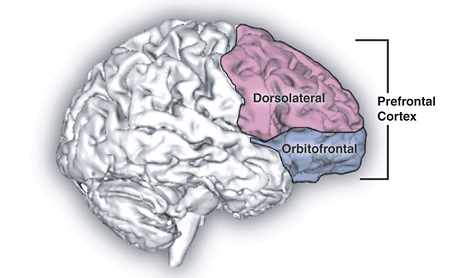The Gist
 It’s no surprise that stress can make it harder to focus and
concentrate. For years, researchers weren’t sure exactly why. A recent study
published in PLoS Computational Biology
begins to answer the question. The study, written by researchers working at the
University of Wisconsin, helps explain how stress breaks down the brain
functions needed for what is called “working memory.”
It’s no surprise that stress can make it harder to focus and
concentrate. For years, researchers weren’t sure exactly why. A recent study
published in PLoS Computational Biology
begins to answer the question. The study, written by researchers working at the
University of Wisconsin, helps explain how stress breaks down the brain
functions needed for what is called “working memory.”Working memory is the immediate conversation happening in the brain that allows people to be productive. Neurons in the part of the brain called the “prefrontal cortex” store and continually erase and rewrite a huge amount of information. It’s how we know how to finish a sentence we started 30 seconds ago, or accomplish a complicated task.
Working memory makes it possible to sustain attention, focus, reason and multitask. However, uncontrollable stressors—which are more intense than manageable stress like worry or social anxiety—disrupt that ability.
The Expert Take
“Up to a point, stress energizes us, focuses our attention, and improves our ability to solve problems,” said John Krystal, M.D., chair of the Department of Psychiatry at Yale School of Medicine. “However, we have also had the experience when the stress gets too severe, that we feel overwhelmed…we can't focus our thoughts.”People with high-pressure jobs or high levels of anxiety are more likely to make mistakes or have accidents while performing everyday tasks.
“This type of stress causes about half of all workplace accidents,” said David Devilbiss, a scientist at the University of Wisconsin’s psychology department, and lead author of the study.
To avoid stress-induced problems or accidents, don’t procrastinate or save preparation for important decisions to the last minute, Dr. Krystal suggested. Working with a team to take on a complicated problem can also help lower stress levels.
Source and Method
Researchers from the University of Wisconsin-Madison studied rats working their way through a maze. They exposed some of the rats to loud, white noise—which, according to the study, is a known stressor and can impair prefrontal cortex abilities.The study found that the rats reacting to the white noise were less able retain the immediate information and memory needed to navigate the maze, compared to rats who weren’t stressed out.
The study was published Sept. 14, 2012.
Other Research
There have been many studies looking at the link between stress and memory.A 2009 study published in the Journal of Neuroscience found stress hormones help us to remember bad memories, but have the opposite affect on attentional, sensory memory.
A Columbia University Medical Center study published this month gives insight into stress-related memory disorders like PTSD. By studying the effect of stress on the brain, researchers discovered an experimental drug that could help treat PTSD.
A small study out of the Netherlands this month studied soldiers’ brains, and found that combat changes activity in the brain that declines working memory, making it harder to sustain attention. Researchers also found that after 18 months, the brain overcame these problems.
No comments:
Post a Comment